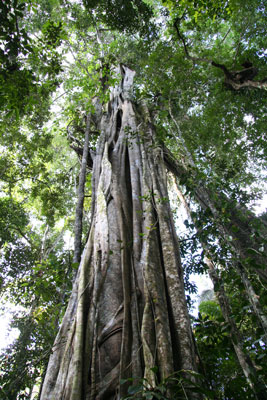Rainforest conservation worth the cost shows new study
University of Alberta news release
November 2, 2005
The economic benefits of protecting a rainforest reserve outweigh the costs of preserving it says a new study published in Proceedings of the National Academy of Sciences. A cost-benefit analysis of Mabira Forest Reserve in southern Uganda found that conservation was economically viable despite intense pressures to exploit the forest for timber harvesting, fuelwood, charcoal production, and agricultural development. The research suggests rainforest conservation can play an important economic role in rural communities.
The economic benefits of protecting a rainforest reserve outweigh the costs of preserving it, says University of Alberta research–the first of its kind to have conducted a cost-benefit analysis on the conservation of species diversity.
“The traditional moral and aesthetic arguments have been made about why we should conserve the biodiversity in rainforests, but little has been done that looks at whether it makes pure economic sense to do so,” said Dr. Robin Naidoo, who did his PhD at the U of A in biological sciences and rural economy. “We provide some good evidence from a strict economic side, that yes, it does.”
Naidoo, now with the World Wildlife Fund, and Dr. Wiktor Adamowicz, from the U of A’s Department of Rural Economy, examined the costs and benefits of avian biodiversity at the Mabira Forest Reserve in southern Uganda. They wanted to see if it was economically viable to protect this forest in an area where an impoverished community is heavily dependent on the region’s resources. Pressure on the forest is intense–harvesting timber, making charcoal, collecting fuelwood and agricultural development compete with rainforest conservation.
Since 1996, an ecotourism centre has been established at the forest and a growing number of international tourists continue to visit the reserve. Naidoo and Adamowicz found that the higher the number of bird species that could be seen, the more tourists would be willing to pay. And by increasing entrance fees, the reserve could preserve 90 per cent–or 131 species–of the forest’s birds.
 Strangler fig in the rainforest. Picture by R. Butler |
“This is one of the few studies where people have put a tangible number on what rainforest biodiversity is worth to them,” said Naidoo, adding that the benefits should be distributed to the local people bearing the conservation cost. “And although this is about a Uganda forest, it has international implications.”
The research team also learned that based on current land values, it would not be economically justifiable to convert agricultural land back into forest. In other words, it is far cheaper to preserve these tropical forests now than to rehabilitate spoiled ecosystems in the future.
“There have been lots of examples of dollar figures associated with rainforests but this looked specifically at whether it is economically worth it to preserve diversity or would they be better off selling the land privately,” said Adamowicz. “By providing a cost-benefit analysis, this study has just closed the loop.”
This is a modified press release from the University of Alberta.